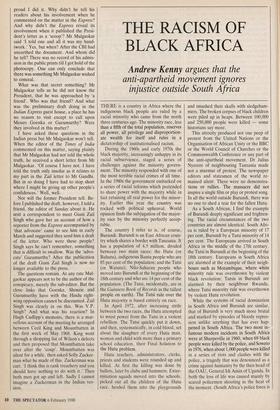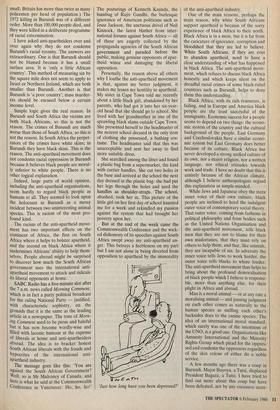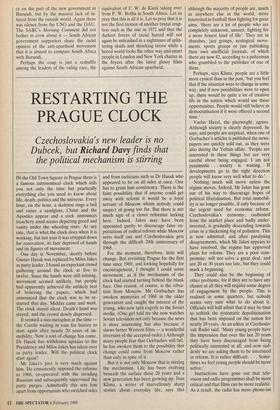THE RACISM OF BLACK AFRICA
anti-apartheid movement ignores injustice outside South Africa
THERE is a country in Africa where the indigenous black people are ruled by a racial minority who came from the north three centuries ago. The minority race, less than a fifth of the total population, reserves all power, all privilege and disproportion- ate wealth for itself and rules in a dictatorship of institutionalised racism.
During the 1960s and early 1970s the black majority, increasingly unhappy in its racial subservience, staged a series of challenges against the minority govern- ment. The minority responded with one of the most terrible racial crimes of all time. In the 1980s the government embarked on a series of racial reforms which pretended to share power with the majority while in fact retaining all real power for the minor- ity. Earlier this year the country was rocked with political upheaval. World opinion finds the subjugation of the major- ity race by the minority perfectly accep- table.
The country I refer to is, of course, Burundi. Burundi is an East African coun- try which shares a border with Tanzania. It has a population of 4.5 million, divided between two main races: the Hutu (or Bahutu), indigenous Bantu people who are 85 per cent of the population; and the Tutsi (or Watutsi), Nilo-Saharan people who moved into Burundi at the beginning of the 18th century and who are 14 per cent of the population. (The Tutsi, incidentally, are in the Guinness Book of Records as the tallest people on earth). The Tutsi rule over the Hutu majority is based entirely on race.
In April 1972, after increasing strife between the two races, the Hutu attempted to wrest power from the Tutsi in a violent rebellion. The Tutsi quickly put it down, and then, systematically, in cold blood, set about the slaughter of every Hutu man, woman and child with more than a primary school education, their Final Solution to the Hutu problem.
Hutu teachers, administrators, clerks, priests and students were rounded up and killed. At first the killing was done by bullets, later by clubs and hammers. Exter- mination squads moved into the schools, picked out all the children of the Hutu race, herded them into the playgrounds and smashed their skulls with sledgeham- mers. The broken corpses of black children were piled up in heaps. Between 100,000 and 250,000 people were killed — some historians say more.
This atrocity produced not one peep of protest from the United Nations or the Organisation of African Unity or the BBC or the World Council of Churches or the Commonwealth Conference or any part of the anti-apartheid movement. Dr Julius Nyerere of neighbouring Tanzania made not a murmur of protest. The newspaper editors and statesmen of the world re- mained silent. There were no demonstra- tions or rallies.. The massacre did not inspire a single film or play or protest song. In all the world outside Burundi, there was no one to shed a tear for the fallen Hutu.
As a South African, I find the example of Burundi deeply significant and frighten- ing. The racial circumstances of the two countries are almost identical. South Afri- ca is ruled by a European minority of 17 per cent, Burundi by a Tutsi minority of 14 per cent. The Europeans arrived in South Africa in the middle of the 17th century, the Tutsi in Burundi at the beginning of the 18th century. Europeans in South Africa are alarmed at the example of their neigh- bours such as Mozambique, where white minority rule was overthrown by violent black revolution; Tutsis in Burundi are alarmed by their neighbour Rwanda, where Tutsi minority rule was overthrown by violent Hutu revolution.
While the systems of racial domination in South Africa and Burundi are similar, that of Burundi is very much more brutal and marked by episodes of bloody repres- sion unlike anything that has ever hap- pened in South Africa. The two most in- famous modern incidents in South Africa were at Sharpeville in 1960, when 69 black people were killed by the police, and Soweto in 1976, when about 1,000 people were killed in a series of riots and clashes with the police, a tragedy that was denounced as a crime against humanity by the then head of the OAU, General Idi Amin of Uganda. In both the loss of life was caused mainly by scared policemen shooting in the heat of the moment. (South Africa's police force is small; Britain has more than twice as many policemen per head of population.) The 1972 killing in Burundi was of a different order. More than 100,000 people died, and they were killed in a deliberate programme of racial extermination.
I have asked anti-apartheiders over and over again why they do not condemn Burundi's racial tyranny. The answers are extraordinary. One is that Burundi should not be blamed because it has a small surface area. It is 'only a little African country'. This method of measuring sin by the square mile does not seem to apply to Israel or Northern Ireland, which are both smaller than Burundi. Another is that Burundi is 'a poor country'; mass murder- ers should be excused below a certain income level.
Simple logic gives the real reason. In Burundi and South Africa the victims are both black Africans, so this is not the reason. The crimes of Burundi are much worse than those of South Africa, so this is not the reason. In South Africa the perpet- rators of the crimes have white skins; in Burundi they have black skins. This is the reason. The anti-apartheid movement does not condemn racial oppression in Burundi because it believes black people are moral- ly inferior to white people. There is no other logical explanation.
Indeed, large parts of world opinion, including the anti-apartheid organisations, seem hardly to regard black people as humans at all. They seemed to look upon the holocaust in Burundi as a messy incident between two uninteresting animal species. This is racism of the most pro- found kind.
The racism of the anti-apartheid move- ment has two important effects on the continent of Africa, the first on South Africa where it helps to bolster apartheid, and the second on black Africa where it undermines Africans' ability to help them- selves. People abroad might be surprised to discover how much the South African government uses the international anti- apartheid movement to attack and ridicule its liberal opponents at home. SABC Radio has a five-minute slot after the 7 a.m. news called Morning Comment, which is in fact a party political broadcast for the ruling National Party — justified, with characteristic sophistry, on the grounds that it is the same as the leading article in a newspaper. The tone of Morn- ing Comment used to be pious and baleful but it has now become wordly-wise and filled with laconic humour at the expense of liberals at home and anti-apartheiders abroad. The idea is to bracket honest South African liberals with the frauds and hypocrites of the international anti- apartheid industry.
The message goes like this: 'You are against the South African Government?
Well, so is Mr Mulroney of Canada, and here is what he said at the Commonwealth Conference in Vancouver. Ho, ho, ho!' The posturings of Kenneth Kaunda, the humbug of Rajiv Gandhi, the burlesque ignorance of American politicans such as Jesse Jackson, the unctuous drivel of Neil Kinnock, the latest blather from inter- national forums against South Africa — all of these are eagerly collected by the propaganda agencies of the South African government and paraded before the public, making genuine opponents of apar- theid wince and damaging the liberal opposition.
Personally, the reason above all others why I loathe the anti-apartheid movement is that, against my better judgment, it makes me lessen my hostility to apartheid. My sister in Cape Town told me recently about a little black girl, abandoned by her parents, who had got it into her six-year- old head that she should go to school. She lived with her grandmother in one of the sprawling black slums outside Cape Town. She presented herself to the headmaster of the nearest school dressed in the only item of clothing she possessed, a bathing cos- tume. The headmaster said that this was unacceptable and sent her away to find more suitable dress.
She searched among the litter and found a plastic bag from a supermarket, the kind with carrier handles. She cut two holes in the base and arrived at the school the next day dressed in the plastic bag: she had put her legs through the holes and used the handles as shoulder-straps. The school, abashed, took her in. This picture of the little girl on her first day of school haunted me for a week and rekindled my passion against the system that had brought her poverty upon her.
But at the end of the week came the Commonwealth Conference and the wick- ed dishonesty of its speeches against South Africa swept away my anti-apartheid an- ger. This betrays a feebleness on my part but I am not alone in being diverted from opposition to apartheid by the immorality `hat how long have you been depressed?' of the anti-apartheid industry.
One of the main reasons, perhaps the main reason, why white South Africans support apartheid is because of the sorry experience of black Africa to their north. Black Africa is in a mess, but it is far from the caricature of ignorance, corruption and bloodshed that they are led to believe. White South Africans, if they are ever to abandon apartheid, need to have a clear understanding of what has happened in black Africa. The anti-apartheid move- ment, which refuses to discuss black Africa honestly and which keeps silent on the dreadful racial crimes of some black-ruled countries such as Burundi, helps to deny them this understanding.
Black Africa, with its rich resources, is failing, and in Europe and America black people are the least successful of the immigrants. Economic success for a people seems to depend on two things: the econo- mic system of the country and the cultural background of the people. East Germany and Czechoslovakia have a similar econo- mic system but East Germany does better because of its culture. Black Africa has never developed,a strong unified culture of its own, nor a major religion, nor a written language, nor ethical attitudes towards work and trade. I have no doubt that this is entirely because of the African climate, although I believe anthropologists regard this explanation as simple-minded.
While Jews and Japanese obey the stern inner voice of their own culture, black people are inclined to heed the indulgent outer voice of contemporary social theory. That outer voice, coming, from fashions in political philosophy and from bodies such as the United Nations Organisation and the anti-apartheid movement, tells black men that they are not to blame for their own misfortunes, that they must rely on others to help them, and that, like animals, they are incapable of sin. In adveisity the inner voice tells Jews to work harder, the outer voice tells blacks to whine louder. The anti-apartheid movement thus helps to bring about the profound demoralisation of black people which I believe is responsi- ble, more than anything else, for their plight in Africa and abroad.
Man is a moral animal — or at any rate a moralising animal — and passing judgment on each other comes as naturally to the human species as sniffing each other's backsides does to the canine species. The idea of an international moral standard, which surely was one of the intentions of the UNO, is a gdocl one. Organisations like Amnesty International and the Minority Rights Group which plead for the oppres- sed and condemn the oppressors regardless of the skin colour of either do a noble service.
A few months ago there was a coup in Burundi. Major Buyoya, a Tutsi, displaced President Bagaza, a Tutsi. I have tried to find out more about this coup but have been defeated, not by any excessive secre- cy on the part of the new government in Burundi, but by the massive lack of in- terest from the outside world. Again there was silence from the UNO and the OAU. The SABC's Morning Comment did not bother to crow about it — South African government supporters share the racist opinion of the anti-apartheid movement that it is absurd to compare South Africa with Burundi.
Perhaps the coup is just a reshuffle among the leaders of the ruling race, the equivalent of F. W. de Klerk taking over from P. W. Botha in South Africa. Let us pray that this is all it is. Let us pray that it is not the first tremor of another brutal erup- tion such as the one in 1972 and that the darkest forces of racial hatred will not again be unleashed in a nightmare of splin- tering skulls and shrieking terror while a bored world looks the other way and smart people in London and New York chatter in the foyers after the latest glossy films against South African apartheid.




















































 Previous page
Previous page